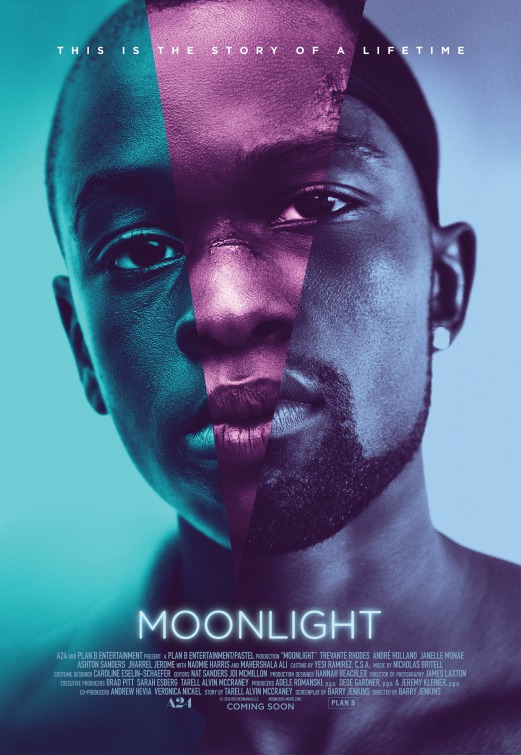 Since Barry Jenkins' new film Moonlight is told in triptych style, we've opted to bring you our NYFF review in the same way with three of us writing it! - Editor
Since Barry Jenkins' new film Moonlight is told in triptych style, we've opted to bring you our NYFF review in the same way with three of us writing it! - Editor
"Little" by Murtada Elfadl
Moonlight is a patient movie that takes its time to give us a full portrait of what goes on in a young man’s mind. Long beautifully rendered scenes provide us pivotal snippets of days in a life. The economy of the scenes mixed with the patience in storytelling means that every gesture and word counts. Barry Jenkins takes Tarell McCraney’s unproduced play "In Moonlight Black Boys Boys Look Blue" and paints it on screen, using his actors’ faces and bodies to deliver singular poetic images.
The languid melancholic tone fits the inner monologue of the main character Chiron (who is called "Little" in this first of three segments), who is struggling to understand himself...
He's played as a 9 year old by the extraordinarily introspective yet expressive Alex Hibbert. In the first part we see him isolated and terrorized at school, with his mother Paula (Naomie Harris), playing with his only friend Kevin (Jaden Piner) and meeting mentor Juan (Mahershala Ali) who will loom large in his life.

Harris is ferocious and revelatory, making clear from the beginning that the love Paula has for her son is mixed with cruelty, as if she thinks he deserves the bullying he gets for being gay. That cruelty is opposition to the tenderness Ali as Juan provides, and what gay boy hasn’t felt both as people around them start to become aware of their sexuality, sometimes before they do. This is where Little’s story stuns, every interaction comes with a jolt of recognition.

"Chiron" by Manuel Betancourt
If the film’s first third mingles wily innocence with the hardened edge of Miami’s Liberty City, its middle section bristles with adolescent aggression. No longer “little,” Chiron is now a lanky, introverted young man (Ashton Sanders) whose eyes continue to scan the rooms he’s forced to inhabit, aware that he’s perpetually trapped within them: boys at school taunt him, his mother continues to lash out at their shared home, and that last safe haven of his, Juan’s apartment, is now devoid of his comforting presence.

"Black" by Nathaniel R
If the second act ends by bringing the house down — you’ll excuse the stage metaphor since Moonlight was inspired by a play — the third wisely doesn’t attempt to top it or rebuild. When we return to Chiron, now an adult, the film is newly subdued -- world weary you might say. Chiron now answers to “Black,” a nickname he had resisted in earlier installments. At first glance this grown man, now a hulking intimidatingly muscular silent giant, is unrecognizable from the boy we had developed such intimacy with. But appearances can be deceiving as they’re more nurture than nature.
Moonlight’s grand and unusually well-executed theme is identity. And as in real life “coming of age” is far more complicated and less inevitable than the phrase implies. You don’t get there by merely enduring each new turn of the clock; you have to engage with your true self. The terrific actor Trevante Rhodes who plays Chiron as an adult looks nothing like his predecessors but somehow alchemizes their souls. In the early scenes he’s something like a purposefully less charismatic imitation of Juan but when he visits his mother (Naomie Harris is the only actor to appear in all three parts) or reunites with Kevin (now played by André Holland) Rhodes magically conjures up the introverted boy and the angry teenager. His earlier selves don’t change his tough exterior but they’re suddenly visible just under the skin. Here is a man who has never quite become himself but is hardly a chameleon who can become someone else. That’s the nature he’s been repressing but finally meeting again in this brilliant movie’s heartbreakingly quiet finale.

Moonlight opens on October 21st in select cities. Consider it unmissable.
Oscar Chances: Yes. In all categories but particularly Supporting Actress (Naomie Harris), Supporting Actor (Mahersha Ali), and Best Picture though it might be an uphill climb for many of them as it's closer to an art film than a typical Oscar play.